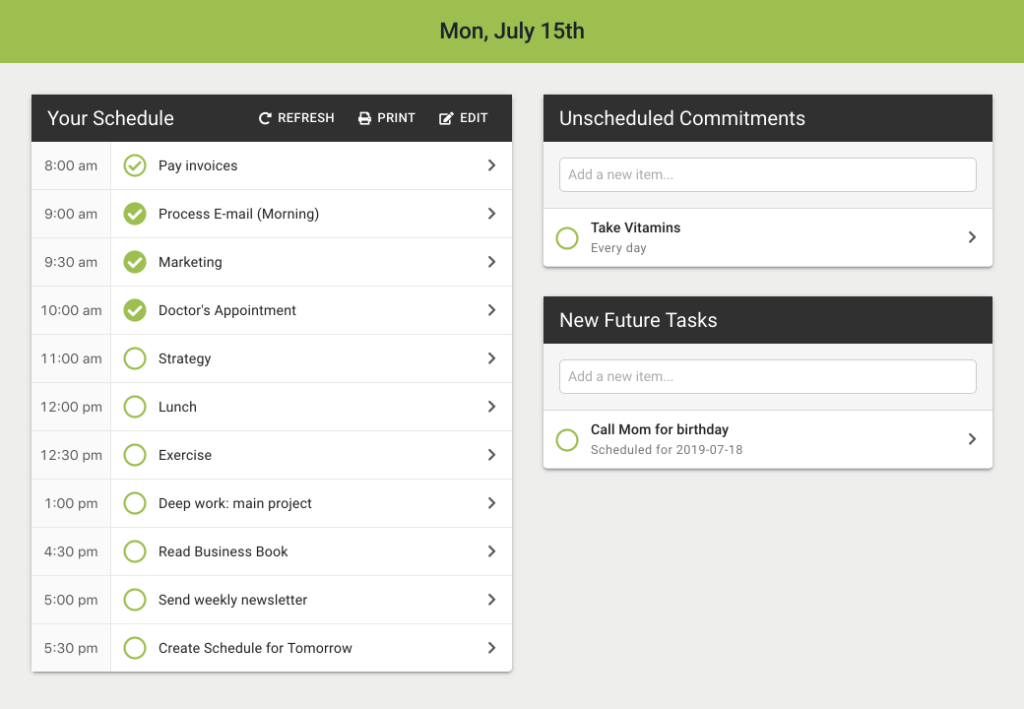Ever hit a rut where you can’t make any progress? You put aside a project for a few days, and then can’t get back into it. Or you’ve hit a roadblock which is sapping all your energy. How do you get back in the flow and regain momentum?
One method: Create a “Quick Win” list
What Is a Quick Win?
Quick wins are things you can do that take only a little effort, but that feel like an accomplishment. Quick wins often don’t have a huge impact on your goals, so we dismiss them as not important or defer them until later. But quick wins can help jumpstart your focus and motivation, so you can tackle larger goals.
When defining your quick wins, it’s important to look for tasks that won’t take much effort or time. To gain momentum, it helps to do a series of tasks in quick succession that give you a sense of accomplishment. Completing these quick wins gives you forward momentum and increases the dopamine levels in your brain–which current brain research indicates increases your motivation.
The net result: check off a couple quick wins, and you create the momentum and motivation required for your larger goals.
What are some tips for effectively using quick wins?
Brainstorm Your Quick Wins First
Don’t jump right into tackling quick wins. There’s a mental energy required to decide what tasks constitute quick wins. Switching from action mode to brainstorming and analysis mode in between each quick win will slow you down.
Instead, take the time upfront to brainstorm all your potential quick wins and decide on which you plan to tackle. Then you can quickly work down your list for maximum momentum.
Time Box Your Quick Wins
Pick a fixed time for each quick win, and attempt to accomplish it within that time period. I recommend creating separate lists of 15-minute, 30-minute and 1-hour quick wins to start.
Or use longer time frames if your normal accomplishment cadence is longer. For projects that usually take weeks to accomplish something, a quick win might be a 1-day or 2-day task.
Once you have a list of your quick wins, you’ll want to start with the shorter quick wins first, then ramp up to the longer quick wins. This ensures you don’t need much motivation to get started and allows you to “accelerate” your momentum as you work down your list.
Accelerate to Big Wins
Quick wins can be addictive, so make sure you use them as a jumpstart and not as your main work strategy. Switch to your big wins once you’ve gotten enough forward momentum, as it’s often the tasks that require more motivation and focus that will give you a bigger payoff.
Consider tackling a few 15-minute or 30-minute quick wins in the morning to give yourself momentum, then switch to your bigger projects. If you’re recovering from burn-out, or just need a break after a large project, you might do quick wins for a couple days to regain momentum.
But if you find yourself continually doing quick wins, especially if you’re not increasing to longer or harder quick wins, you may be using quick wins as a form of procrastination. At that point, stop and use a different strategy to focus on your larger projects.
Create Standard Quick Wins
Quick wins can take time to think up. If you often have low motivation or momentum, consider creating a repeatable quick win.
For example:
- Contact 1 new potential customer
- Check in with 1 person in your network
- Share 1 new article on social media
- Remove 5 emails from your inbox
- Email 1 customer asking for feedback
You can prepare for these standard quick wins by keeping a running list of potential customers, articles to share, or people to network with. Then when you need to regain your momentum, you can just work down your list of standard quick wins.
Next Steps
Quick wins can be a useful strategy for regaining momentum. To use this strategy:
- Brainstorm potential low-effort, short tasks
- Divide into lists based on length or effort
- Start with the lowest effort or shortest tasks, then ramp up
- Create reusable quick wins for the future
Have you tried using quick wins to regain momentum? How did it go?








